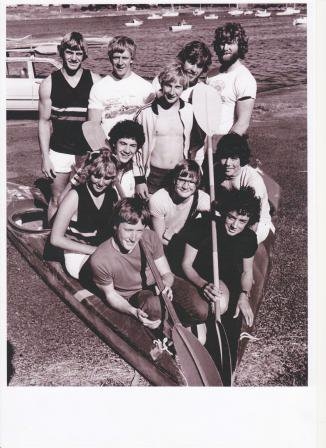Why kayak?
My wife believes that kayaking involves being uncomfortable, wet, cold and exposed to physical danger. As a result it holds absolutely no appeal to her. Fortunately she is exceptionally tolerant of my own love for the sport. So what is it that motivates me, and many others, to kayak?
I first stepped into a kayak early in 1975 at the age of 12. Right from the start I loved the feeling of freedom and the challenge of getting the boat to go in a straight line. As an over-weight youngster, it was one of the first times I could do a sport as well or better than others. Swimming was the other sport where I felt competent, and like paddling I had gravity assistance! For teenagers in Tasmanian society, status depended on sporting prowess, so I wanted to achieve competitive success and prove myself to others. The more I paddled, the more too I enjoyed the experience of being on wild rivers, the challenge of first descents, the buzz of getting to the bottom of a tough rapid. This involved learning to trust and be trusted by my mates, as we pushed our limits on more and more remote rivers.
If I bring a psychological perspective to my history, kayaking fulfilled several important human needs for me as a teenager. It met my needs for competence, status, and relationship with others. It was fun and provided emotional satisfaction, and through time in the wilderness, fed an emerging sense of awe and transcendence. Reflecting on why I am still kayaking 36 years on, how has my motivation changed?
I’m less concerned now about proving myself to others or achieving social status, but I still get a kick out of being good at kayaking, at testing myself, and learning new skills. I still love the feeling of fear turned to exhilaration that comes with a sweet line down a waterfall, or nailing a clean run on a slalom course. Psychologists call this ‘self oriented mastery’. If I’m honest, kayaking also sustains my fantasy that I can avoid old age. Psychologists call this delusion! I am still motivated by paddling with friends and love the banter, so this hasn’t changed. The opportunities for transcendence are probably more important for me as I get older. I value more than ever the chance to be in a wild place and feel connected with a natural river. I might even call this a spiritual dimension to paddling. Carl Jung once said there are no problems of mid-life that don’t have an underlying spiritual dimension. So in my mid-life, I feel fortunate indeed that kayaking offers a basis for deeper experience and connection.
So my motivation hasn’t changed so much as evolved over the years, because for me kayaking meets important, even fundamental, human needs. But while this might explain my continuing passion for the sport, it doesn’t address why my wife, or in fact many other people, struggle to see the sport’s appeal.
That’s a question about opportunity and personality that deserves its own post, so watch this space…
In the meantime, here’s a photo of the1981 Tasmanian kayaking team – I’m still in touch with most of them, and they include some of my oldest and best mates.

Tasmanian kayak team 1981


